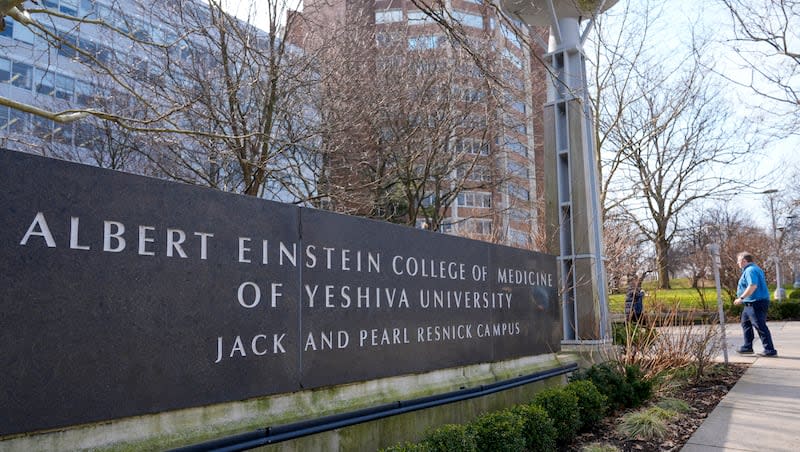What would you do with a billion dollars?

Do you ever daydream of suddenly coming into large amounts of money? How about a billion dollars? How would you spend that money? Invest in a baseball stadium? Real estate? A social media company?
Dr. Ruth Gottesman had that very decision to make when she found out in 2022 that her husband had left her a staggering amount of money. “He left me, unbeknownst to me, a whole portfolio of Berkshire Hathaway stock,” she told The New York Times. The instructions were simple: “Do whatever you think is right with it.”
Her husband, a protégé of Warren Buffett, made an early investment in Berkshire Hathaway and subsequently ran his own investment firm. The investment grew.
Gottesman, 93, a former professor at Albert Einstein College of Medicine in the Bronx and current chair of the board of trustees, decided the best way to invest her billion dollars was to pay medical school tuition for all students at the college, in perpetuity.
Gottesman announced the gift and its purpose to students and faculty at Albert Einstein College of Medicine Monday, bringing some in the audience to tears and others to their feet, cheering. The gift is believed to be the largest made to any medical school in the country, according to Montefiore Einstein, the umbrella organization for Albert Einstein College of Medicine and the Montefiore Health System.
We are profoundly grateful that Dr. Ruth Gottesman, Professor Emerita of Pediatrics at @EinsteinMed, has made a transformational gift to #MontefioreEinstein—the largest to any medical school in the country—that ensures no student has to pay tuition again. https://t.co/XOy9HZLbfD pic.twitter.com/1ijv02jHFk
— Montefiore Health System (@MontefioreNYC) February 26, 2024
The donation is going to a medical school In New York City’s poorest borough, with high rates of premature births, and which ranks as the unhealthiest county of the 62 counties in the state. It’s also one where nearly half of the new doctors have been graduating with student loan debt that exceeds $200,000, about double the amount owed by students graduating from other New York City medical schools.
Gottesman said she hoped that removing the high monetary barrier to attend medical school would not only benefit current students, but would also increase opportunities for students who wouldn’t have even considered medical school because of the cost. Of Einstein’s first-year medical students, 59% are women and 49% are New Yorkers, although students come from 22 states and 16 countries. There’s even a Utah connection — one first-year student graduated from Brigham Young University, according to a report by the Einstein.
All current seniors will have their spring 2024 tuition reimbursed, and beginning in August all students going forward will be able to attend tuition-free. For the current class of 183 students there were 9,012 applications. The number applying is sure to increase with Monday’s news.
Dr. Philip Ozuah, president and CEO of Montefiore Einstein, the umbrella organization for Albert Einstein College of Medicine and Montefiore Health System, said in Monday’s press release that he was “profoundly grateful to Gottesman for this historic and transformational gift. I believe we can change health care history when we recognize that access is the path to excellence.” Dr. Yaron Tomer, the Marilyn and Stanley Katz Dean at Albert Einstein College of Medicine, said that the donation would “radically revolutionize” their ability to attract “students who are committed to our mission, not just those who can afford it.”
Ozuah, originally from Nigeria, and Gottesman, already acquaintances and colleagues, became close friends in early 2020. The pandemic hit and the Gottesmans got sick. Ozuah made daily house calls, in full protective gear, to check on the couple as they recovered. “That’s how the friendship evolved,” Ozuah said to The New York Times. “I spent probably every day for about three weeks, visiting them.”
About three years ago, Ozuah asked Gottesman to head the medical school’s board of trustees. She had done the job before, but given her age, she was surprised. The gesture reminded her of the fable about the lion and the mouse, she told Ozuah at the time, explaining that when the lion spares the mouse’s life, the mouse tells him, “Maybe someday I’ll be helpful to you.”
In December, Gottesman went to see Ozuah to tell him the mouse’s moment had come. She asked him, “If someone said, ‘I’ll give you a transformative gift for the medical school,’ what would you do?”
There were probably three things, Ozuah said.
“One,” he began, “you could have education be free —”
“That’s what I want to do,” she said. He never mentioned the other ideas.

